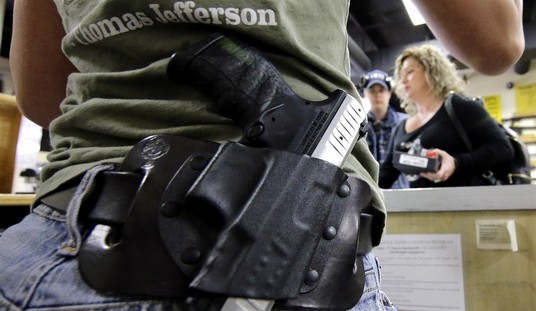Wisconsin Governor Tony Evers says he might call a second special session on gun control, even though the first special session was gaveled out by Republicans after less than a minute, and lawmakers have made it clear that they’re not going to vote on the governor’s anti-gun agenda. On Tuesday, Florence County, in the far northeast reaches of the state, sent a message to Madison and Governor Evers of their own: we will not comply.
Mark Kerznar, owner of Saloon No. 2 in Spread Eagle, said he approached the county about becoming a Second Amendment sanctuary after hearing Evers wanted a “red flag” law — which would gives judges the power to take weapons away from people deemed to be a threat to themselves or others — and universal background checks.
“The governor is not a friend of the Second Amendment,” Kerznar said.
Gun control advocates in Madison described the bills as moderate proposals that most Wisconsin residents support.
At the Florence meeting, Kerznar’s proposal had a receptive audience of at least 75 people, plus a sympathetic board.
“We don’t need to give any more authority to Madison,” Supervisor Edwin Kelley said to open the debate Tuesday.
Not that there was much debate. All who spoke Tuesday urged the board to pass the measure, which it did unanimously to applause from those who filled the Florence County courtroom.
Okay, let’s all take a second to appreciate the fact there’s a place called Spread Eagle, Wisconsin.
We all good? Good.
75 people is a pretty good turnout for any county, but Florence County is one of the least-populated in the state, with less than 5,000 residents. The right to keep and bear arms isn’t just an issue, it’s the issue for a lot of folks at the moment, as the county sheriff and commissioners made clear.
Sheriff Dan Miller led off the comments, declaring, “I believe in God. I believe in guns.” He said existing laws were enough to handle anyone who might commit a crime with a firearm. The sanctuary resolution spells out that the sheriff will be able to “exercise sound discretion to not enforce against any citizen an unconstitutional firearms law.”
Aaron Volling, commander of the Veterans of Foreign Wars Post 3635 in Florence, said veterans fought to preserve such Constitutional rights.
“You’re right, they fought for that right,” county board Chairwoman Jeanette Bomberg responded. She observed the forefathers had great foresight in 1791 to lock in gun rights.
“I have a right to keep and bear arms,” said Supervisor Holly Wahlstrom Stratton, later adding that dictatorships start with the government confiscating guns.
It seems like every day is bringing word of a new Second Amendment Sanctuary county somewhere in the country. Already this week we’ve seen several counties in Florida and at least three in Texas adopt Second Amendment Sanctuary resolutions. While the language may differ, and some may be more symbolic (for now, at least) than others, the basic message for every one of these communities is simple: don’t expect any new gun control laws to enforced by our local law enforcement.
As I argued yesterday, there are plenty of prosecutors and law enforcement officers around the country who are choosing not to prosecute or arrest for any number of offenses. Second Amendment Sanctuaries are no different than San Francisco becoming a Public Pooping Sanctuary, at least in terms of prosecutorial discretion or enforcement priorities for police. I would argue, of course, that the right to keep and bear arms is an actual right, as opposed to the ability to drop trou and leave a steaming street biscuit on the sidewalk without fear of arrest, but if you can cop a squat on a city street without fear of arrest, why shouldn’t you be able to loan a gun to friend fearful of her ex breaking into her home and hurting her without worrying about being prosecuted if she does have to use the gun in self-defense? If cops have the discretion not to arrest someone for the misdemeanor offense of possessing small amounts of drugs, why wouldn’t they have the discretion not to arrest someone for the misdemeanor offense of possessing a “high capacity” ammunition magazine?
What we’re seeing when places like Florence County, Wisconsin declare themselves a Second Amendment Sanctuary is that civil and civic disobedience are the most likely responses, at least at the local level, to any new gun control laws that might pass. We’re already starting to see the Second Amendment Sanctuary movement begin to grow in Virginia, where Campbell County passed its resolution days after anti-gun politicians took control of the statehouse in Richmond. I myself will be talking to my county supervisors tonight about a Second Amendment Sanctuary resolution where I live, and I’m very hopeful they’ll sign on.
I’m excited about this movement, and far from seeing it as pure symbolism, I believe its laying the groundwork for a new network of Second Amendment supporters from all across the country. The vast majority of these resolutions have come about with folks talking to their neighbors, but when the elected officials and their supporters start talking to their counterparts in other counties, we could see a brand new force in Second Amendment activism. Not to go all Revolutionary War on you, but it does remind me in a way of the Committees Of Correspondence in the years before the War of Independence.
Committees of Correspondence were the American colonies’ first institution for maintaining communication with one another. They were organized in the decade before the Revolution, when the deteriorating relationship with Great Britain made it increasingly important for the colonies to share ideas and information. In 1764, Boston formed the earliest Committee of Correspondence, writing to other colonies to encourage united opposition to Britain’s recent stiffening of customs enforcement and prohibition of American paper money. The following year New York formed a similar committee to keep the other colonies notified of its actions in resisting the Stamp Act.
Many of us Second Amendment supporters subscribe to the idea of rugged individualism, but when it comes to defending our rights, there is power in a union. I think it’s great that activists are using the power of real grassroots to effect change at the local level. I just hope we can take advantage of the Coalition of the Noncompliant that is taking shape around the nation to effect change at the state and national level as well.









